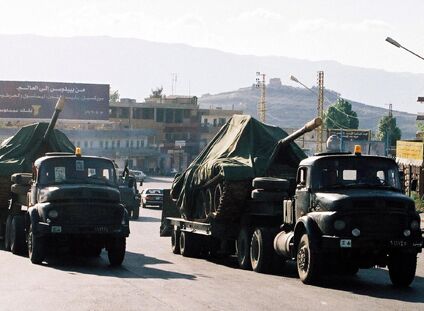
Syria Leaves Lebanon
Hailed as a major victory for Lebanon’s pro-reform forces, Syria completed its military withdrawal from Lebanon on April 26.
There are a couple things here worth considering: first, the impact Syria’s military withdrawal will have on decreasing Syria’s influence and power-broking in Lebanon; and second, to the degree Syria’s influence is decreased, who will fill the void. A third consideration is what this drawdown means for the vulnerable nation of Israel.
As the last Syrian tanks rolled across the border of Lebanon and back into Syria, the West rejoiced. However, though this signaled an end to Syria’s direct military involvement in its neighbor nation, it certainly won’t mean an end to its political interference.
What the Lebanese opposition sees as “victories”—not just the Syrian withdrawal, but also the temporary resignation of two security chiefs, an investigation into the assassination of the former prime minister, and scheduled parliamentary elections—could actually be a means for the current pro-Syrian leadership in Lebanon to ensure that Damascus will remain in control of Beirut (Stratfor, April 22). By giving in to key demands of the opposition movement, the newly designated pro-Syrian Lebanese Prime Minister Najib Mikati is both ensuring the legitimacy of his own government and at the same time undermining the opposition by taking away its unifying causes.
Thus, the Syrian military pulling up stakes in Lebanon, rather than freeing Lebanon from Syrian influence, may yet lead to a cementing of Syrian political control. Also, besides the political influence it still wields, Syria still has a huge economic presence in Lebanon, along with, according to some sources, thousands of agents.
On top of all that, in the past couple months hundreds of thousands of Syrians living in Lebanon reportedly have been illegally given Lebanese citizenship so they can vote for pro-Syrian candidates in upcoming elections (ibid., March 29).
As for who stands to gain in the event of Syria’s strategy not working quite so well, one need only look at demographics. The Shiites are by far the largest religious community in Lebanon—and Hezbollah is the most politically organized and popular Shiite party. As the New York Post reported, “With Syria out and Iran emerging as a bigger player, Hezbollah is sure to demand a greater share of power” (April 28).
Hezbollah—despite the political legitimacy it has gained in Lebanon—has definitely not changed its spots: It remains a terrorist group fully beholden to the dominant power in the region—Iran—and committed to the destruction of Israel. Take the comments of its deputy just a couple weeks ago, when he said the group will offer “material” and “unconditional support” to Palestinians in their struggle against Israel ( Daily Star, Lebanon, April 15). Take the comments of the leader of Hezbollah, Sayyed Hassan Nasrallah, who said on April 19 that Hezbollah would keep its arms until the “threat of aggression ceases to exist and there is no occupied land” ( Reuters, April 19). Hezbollah’s rise means Iran’s rise.
All this spells trouble for Israel. Despite talk of revolution and democracy, it could be that the hand of Israel’s enemies is only strengthened by the pretense of democracy. For the fact is that the Lebanese opposition is so splintered that those who stand to gain the most in upcoming parliamentary elections on May 29 are pro-Syrian candidates and Hezbollah. We may yet see the Levant revolution backfire.
As Stratfor observed in a March 22 report, Israel most likely would have preferred Syria stay in Lebanon—for the “key element to Israeli national security is predictability.” With Syrian troops across the border, Israel could use Syria as a legitimate target when reprisals for terrorist attacks were deemed necessary or expedient—for example, in October 2003, when it mounted an air attack against a Palestinian Islamic Jihad training camp in Syria.
As much as the Israelis didn’t like Syrian troops right over their border, what they’re faced with now may just make them more nervous.
Refer to “The Democracy Paradox” in our May issue of the Trumpet to learn about the ultimate outcome of such “democratic” revolutions in the Middle East. The Trumpet continues to track the progress, prophesied in Scripture, of Iran strengthening its grip on the Middle East and Israel getting backed into a smaller and smaller corner.
